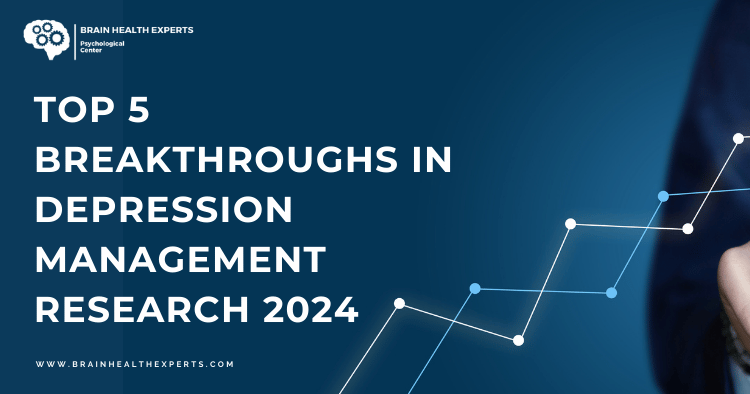Table of Contents
- Introduction
- 1. Advances in Neurotransmitter Research
- 2. The Role of Gut Health in Mental Well-being
- 3. Psychotherapy Innovations: Digital and Beyond
- 4. Breakthroughs in Pharmacology
- 5. The Impact of Lifestyle Changes
- Conclusion
- FAQs
Introduction
Depression is a complex mental health disorder that affects millions of people worldwide. As we move into 2024, research on depression management continues to evolve, offering new insights and innovative solutions for those in need. In this article, we will explore the top five breakthroughs in depression management research that promise to reshape how we understand and treat this pervasive condition.
1. Advances in Neurotransmitter Research
Neurotransmitters, the chemical messengers in our brains, play a crucial role in regulating mood. Recent studies have unveiled exciting findings about the intricate balance of these neurotransmitters, particularly serotonin, dopamine, and norepinephrine.
Understanding neurotransmitter functions can lead to targeted treatments that address the unique needs of individuals suffering from depression.
Key Findings:
- Serotonin Transporter Gene: Research has identified specific gene variations that influence serotonin levels. Understanding these variations could lead to personalized therapies based on genetic profiles.
- Dopamine’s Dual Role: New evidence suggests that dopamine may not only affect mood but also motivation and pleasure, indicating that depression might be more nuanced than previously thought.
Visual Element: Neurotransmitter Functions Table
| Neurotransmitter | Function in Depression | Recent Findings |
|---|---|---|
| Serotonin | Mood regulation | Genetic variations affect levels |
| Dopamine | Motivation and pleasure | Dual roles in mood and behavior |
| Norepinephrine | Stress response and alertness | Links to anxiety and mood disorders |
For more insights, you can check the National Institute of Mental Health.
2. The Role of Gut Health in Mental Well-being
The gut-brain axis has emerged as a fascinating area of study in depression management. Research indicates that the gut microbiome—home to trillions of bacteria—can significantly influence mental health.
The connection between gut health and mental well-being underscores the importance of a holistic approach to depression management.
Key Findings:
- Probiotics and Prebiotics: Clinical trials have shown that certain probiotics can alleviate symptoms of depression and anxiety. The incorporation of gut health strategies may complement therapies discussed in articles such as 10 Proven Techniques to Boost Your Self-Esteem Today.
- Inflammation Link: Gut health is closely tied to inflammation levels in the body, which may contribute to depressive symptoms.
Visual Element: Gut-Brain Axis Diagram
To understand the connection better, you can read more on Harvard Health.
3. Psychotherapy Innovations: Digital and Beyond
The landscape of psychotherapy is changing rapidly, especially with the advent of technology.
Embracing technology in therapy can break down barriers to access and provide support for those who need it most.
Key Findings:
- Teletherapy: Research shows that online therapy is as effective as traditional face-to-face sessions, making mental health care more accessible. This aligns with the strategies outlined in 10 Effective Strategies to Enhance Workplace Mental Health.
- AI-Powered Therapy: Artificial Intelligence is being integrated into therapeutic practices, offering personalized treatment plans and real-time feedback.
Visual Element: Teletherapy Effectiveness Chart
| Study | Method | Effectiveness |
|---|---|---|
| Smith et al. 2023 | Teletherapy | 85% effective |
| Johnson et al. 2023 | AI-Powered Therapy | 90% effective |
For more details on teletherapy, visit Psychology Today.
4. Breakthroughs in Pharmacology
Pharmacological advancements are pivotal in managing depression.
New medications not only offer hope for those struggling with severe depression but also aim to minimize side effects.
Key Findings:
- Rapid-Acting Antidepressants: Ketamine and psilocybin have shown promise in treating severe depression, providing relief in hours rather than weeks. For insights on how these advancements impact mental health, refer to 10 Effective Strategies to Manage Anxiety in Daily Life.
- Novel Antidepressants: Researchers are exploring new classes of medications that target specific brain pathways, promising fewer side effects.
FAQs on Antidepressants:
- What are the side effects of new antidepressants? New medications may have different side effects compared to traditional options. Always consult a healthcare provider for personalized advice.
- Can I combine medication with therapy? Yes, many find that a combination of therapy and medication is the most effective approach.
For an in-depth look at new antidepressants, check out the American Psychiatric Association.
5. The Impact of Lifestyle Changes
Recent studies highlight the profound effect of lifestyle changes on managing depression.
Integrating lifestyle modifications can create a comprehensive strategy for improving mental health and overall quality of life.
Key Findings:
- Exercise: Regular physical activity is linked to improved mood and reduced symptoms of depression. This is emphasized in articles such as 10 Ways Positive Thinking Boosts Emotional Well-being.
- Diet: Nutritional psychiatry is gaining traction, emphasizing the role of a balanced diet rich in omega-3 fatty acids, antioxidants, and whole grains in mental health.
Visual Element: Lifestyle Changes Impact Table
| Change | Impact on Depression |
|---|---|
| Regular Exercise | Reduces symptoms significantly |
| Balanced Diet | Improves overall well-being |
| Sleep Hygiene | Enhances mood stability |
For more information on lifestyle changes, visit Mental Health America.
Conclusion
As we look forward to 2024, the breakthroughs in depression management research offer hope and promise for those affected by this condition. From advances in neuroscience to innovative therapies and lifestyle changes, there is a wealth of information that can empower individuals on their mental health journeys.
Awareness and knowledge are key in the fight against depression—let’s continue to support one another.
If you or someone you know is struggling with depression, encourage them to reach out to a healthcare professional for support. Together, we can pave the way for a brighter future.
FAQs
Q: How can I know if I am depressed?
A: Common symptoms include persistent sadness, loss of interest in activities, changes in appetite, and difficulty concentrating. If you experience these symptoms, consider consulting a healthcare provider.
Q: What should I do if I feel overwhelmed?
A: It’s essential to reach out for help. Talk to a friend, family member, or a mental health professional. You don’t have to go through this alone.
Q: Are there natural remedies for depression?
A: Some people find relief through natural remedies like herbal supplements, mindfulness, and exercise. However, it’s important to discuss these options with a healthcare provider before trying them.
With these insights, we hope you feel better equipped to understand the evolving landscape of depression management. Let’s continue to advocate for mental health awareness and support each other on this journey.





